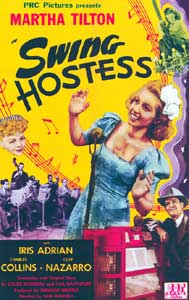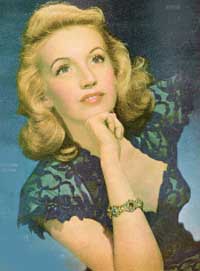 Swing Hostess (1944) incorporates six songs by Jay Livingston, Ray Evans & Lewis Bellin. The songs are definitely smile-worthy.
Swing Hostess (1944) incorporates six songs by Jay Livingston, Ray Evans & Lewis Bellin. The songs are definitely smile-worthy.
Livingston & Evans's best remembered tunes aren't these, but everyone will remember "Mona Lisa," "Buttons & Bows," "Que Sera Sera," the Christmas classic "Silver Bells" & the theme song for "Mr. Ed." There's nothing so familiar in Swing Hostess, but it's all pleasant stuff from darned good composers.
Even though the star, Martha Tilton, never really broke out of B films into stardom, & appeared in only four films, she was nevertheless cute as a button & a very fine singer from the Benny Goodman Orechestra.
At the height of her career she was well known as "the queen of swing" or "Liltin' Miss Tilton" & was with Jack Benny on his 1944 USO tour of the South Pacific. She was a big radio star through the 1950s, & a minor pioneer on early (live) television as her career was coming to a close.
Swing Hostess is set in & around the United Jukebox & Recording Company Booking Agency, providing the primary excuse for the tunes.
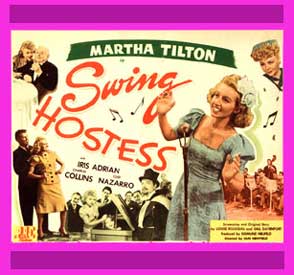 The suburb art deco period hairdos & costumes, especially for the women, make this old film a visual delight. There are also scenes about how non-automatic jukeboxes worked back in those days, a marvelous bit of Americana.
The suburb art deco period hairdos & costumes, especially for the women, make this old film a visual delight. There are also scenes about how non-automatic jukeboxes worked back in those days, a marvelous bit of Americana.
In my lifetime I took jukeboxes so for granted that it never even occurred to me that in their beginnings they were not automatic.
Essentially the customer selects the tune they want, calls the jukebox operator on a phone system, & she plays the choices like a personal DJ from a room with a bank of jukebox operators receiving just such phoned-in requests.
Judy (Tilton) wants a singing career but is stuck in the nowhere job of a jukebox switchboard operator. How Judy keeps missing her opportunity until finally discovered is the skeleton upon which a lot of entertaining bits hang. An array of unusual characters helps make this a first-rate B progrommer.
There's the horn player Bobo (Cliff Nazarro), a great "double talker" which is a largely lost category of comedy when someone seems to be talking but isn't actually saying anything. There's the orchestra leader Benny (Charles Collins), the love-interest who's a good sport when Lucy, not knowing who he is, rips into his band & himself for not recognizing talent after rejecting her recorded audition (she doesn't know her recording was accidentally credited to someone who couldn't actually sing).
There's the platonic boyfriend Joe (Earle Bruce) who gets drafted, & whose character should be analysed as part of the "hidden" gay history of cinema. There's smart-mouthed Marge (Iris Adrian) the spunky best friend of the heroine. There's the bitchy Phoebe (Betty Brodel), whose good looks almost scores her a singing career though she has an awful voice.
There's the absent minded landord Mr. Blodgett (Emmett Lynn) who never gets to use his own bathroom; & his eccentric tennants include among others Lucy, Phoebe, Marge, & Merlini the Magician (Philip Van Zandt).
The ending is obvious from the start, so suspense is not to be found. But a charming cast amidst effective light humor & entertaining tunes make it way more than worth the time.
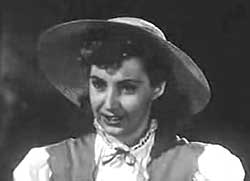 "Fellow countrymen hear me shout/ I've got the whole thing figured out/ What the country needs is more moonlight/ More kisses & sighs/ More little white lies..."
"Fellow countrymen hear me shout/ I've got the whole thing figured out/ What the country needs is more moonlight/ More kisses & sighs/ More little white lies..."
So begins the three-minute soundie What the Country Needs (1941) featuring Martha Tilton in a nice hat, intercut with a soapbox politician in a park made to look like a political wack job, though really it's actor-singer Vince Barnett so wholy committed to the character that he doesn't mind looking awful -- to the point of a Hitleresque mustache.
Pleasanter scenes are cut in, lovers in Central Park, a friendly police officer, people enjoying a woodland evening. At the song's instrumental bridge, a guy in the park pulls out a harmonica & gives a wonderful solo. This is none other than Leo Diamond, one of the greats of the era.
Instead of returning to Martha after Leo's harmonica solo, we're treated instead to nothing less than the vocal stylings of Jimmie Dodd, one of the two grown-ups on the original Mickey Mouse Club! Here he's playing "the singing paperboy" at the park's edge, & he's quite pleasant.
Then the rather unkempt park politico puts in a verse: "I've only just come to realize/ Love makes the world go round," trading off lines with Martha while in her arms. Her advice has apparently cured him of being a wacko politico.
This is frankly a wonderful tune well arranged for the grand effect of an event in Central Park under moonlight, calling even for some actual acting. Soundies of the '40s were just about never this elaborately staged. It's much more like the pre-jukebox soundies which were miniature musicals anywhere from three minutes to one-reel (nine or ten minutes).
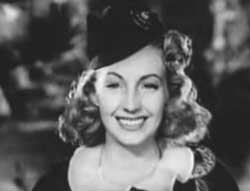 Martha Tilton is backed up by Ben Pollack's Orchestra in Loch Lomon (1941), another elaborately staged soundie that packs more in the three minutes than usually encountered for back-projection jukebox distribution.
Martha Tilton is backed up by Ben Pollack's Orchestra in Loch Lomon (1941), another elaborately staged soundie that packs more in the three minutes than usually encountered for back-projection jukebox distribution.
Martha strides out in a mini-kilt, between two kilted gents playing bagpipes. With a backdrop made to look like a Highlands country cottage, the camera pans in as Martha sings to the two highlanders.
At the instrumental, a choras line of kilted dancers do a sexier than average jig to a jazz arrangement, with close-ups of their legs & knees, as soundies tended to deliver just a little bit of cheesecake whenever they could, to insure a few more coins in the slot from sailors on leave.
When Martha begins singing again it's now less folksy than her first time through as she turns it into a swing jazz close.
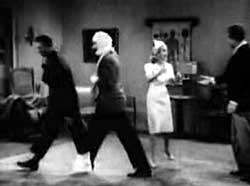 The Slate Brothers appear with Martha Tilton in the jukebox soundie A Little Jive is Good For You (1941).
The Slate Brothers appear with Martha Tilton in the jukebox soundie A Little Jive is Good For You (1941).
As with other of Josef Berne-directed soundies, we get hints of an actual story crammed into three minutes, rather than just the singer & no frills.
It opens in a hospital waiting room with some sick guys seated in misery. Martha walks through in a nurse uniform. The guys perk up upon spotting the blonde bombshell, & she begins to sing them health advice.
It's a sweet little diddy, & it so improves the health of the Slate Brothers that even with their bandages, crutch, & foot-cast, they leap up & do a three-man dance number that really impresses.
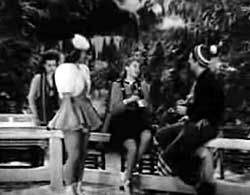 Martha's backed up by Bobby Sherwood's Orchestra in Love Turns Winter to Spring (1941).
Martha's backed up by Bobby Sherwood's Orchestra in Love Turns Winter to Spring (1941).
It opens with a bald waiter (Vince Barnett) clowning around in an outdoor cafe at a winter skating pond, slipping & sliding as he delivers orders, passing a snowman on the banks of the frozen pond.
Martha & her beau (Gene Grounds) take their hot toddies, & they begin to sing the romantic title number, a mild swing love song.
As the instrumental approaches, the camera pans past Bobby Sherwood conducting his orchestra & & settles on ice-skater May Ross skating in her miniskirt.
As Martha & Gene close the song, suddenly they're sitting in the park in spring, drinking Cokes instead of hot toddies. An effective little soundie, novel for having an ice skater instead of the expected dancers to liven things up.
copyright © by Paghat the Ratgirl
|
